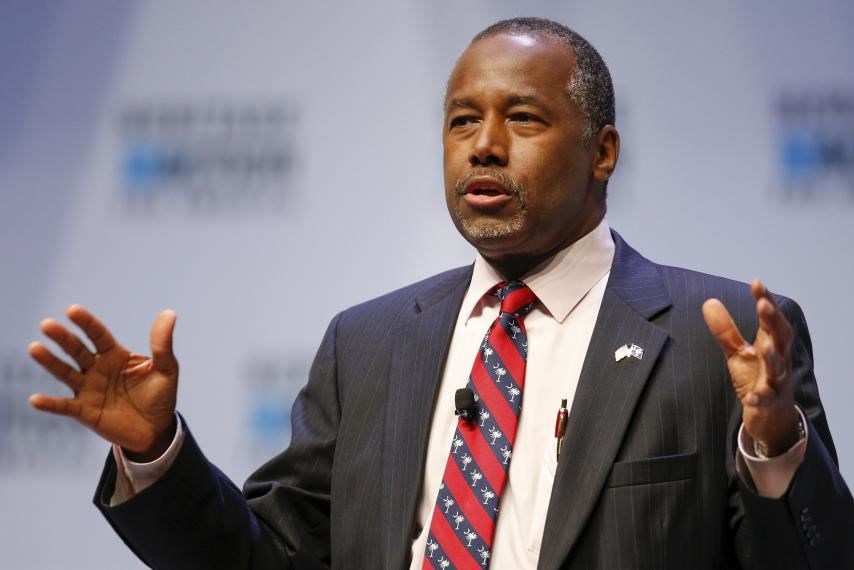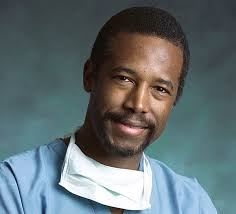"Success is determined not by whether you face your obstacles, but by your reaction to them. And if you look at these obstacles as a containing fence, they become your excuse for failure. If you look at them as a hurdle, each one strengthens you for the next." - Ben Carson
 Carson gives a speechnewsweek.comTools of Heroism
Carson gives a speechnewsweek.comTools of Heroism
“At their best, superhero origin stories inspire us and provide models of coping with adversity, finding meaning in loss and trauma, discovering our strengths and using them for good purpose” (Rosenberg). Robin Rosenberg in her essay “The Psychology Behind Superhero Origin Stories” claims that true heroes are inspirational fighters who learn from their struggles and utilize this knowledge to aid others. In today’s society, heroes assume many different forms; they can be soldiers who willingly sacrifice their lives to defend their country, or firefighters who rescue people from a smoldering building. However, a fatal situation is not necessary to mold true heroes, because true heroes can vary from a neighbor who helps clear a street of snow after handling their own frozen driveway, to a teenage girl who comforts a heartbroken young woman. These selfless acts may affect millions, or just one; they may occur just a single time, or hundreds, but all of them spark a positive ripple through society, thus enabling the selfless person to become a hero. To initiate this ripple, the hero must possess perseverance through adversity and the courage to take risks. Thus, the true, ideal hero is one who bears hardship and obtains knowledge and strength from the experience, then dedicates this knowledge to serving others.
Raised during the height of racial discrimination and poverty for many African-Americans, Benjamin Carson, like a true hero, learned to take charge of his actions and turn his social oppression into a source of purpose in life. Carson was born on September 18, 1951 in Detroit, Michigan. When Carson was just eight years old, his father abandoned the family, leaving Sonya Carson to single handedly raise Ben and his brother Curtis. Mrs. Carson worked multiple jobs, but the Carsons struggled with money; as a result, Carson lacked the educational funding he needed. For the majority of elementary school, Carson endured racial taunts about his poor test scores from his fellow students. Mrs. Carson, an illiterate but determined woman, pushed her son to take on the challenge of reading and instilled in him the idea that one could learn anything through books. Through constantly reading and learning, Carson soon ended the bullying caused by poor test scores. Reading became a stepping stone for many of his future academic successes. After graduating from Yale University, Carson studied at the University of Michigan and became a neurology resident at the Johns Hopkins Hospital in 1984. Despite enduring prejudice all his life, Ben Carson grew into a successful neurosurgeon; he performed surgeries on children deemed incurable by other doctors and eventually became the Director of Pediatric Neurosurgery at the young age of 33. In 1987, the neurosurgeon became internationally renowned for being the first in history to successfully separate twins conjoined at the back of the head. In 2013, Ben Carson retired and created the Carson Scholars Fund, which is dedicated to supporting education and awarding scholarships to students of all races, genders, and ages. A genuine hero must embrace any challenge, and persevere to the people around him. A true doctor at heart, Benjamin Carson embodies the essence of a true contemporary hero by possessing the perseverance and courage to heal others both physically and intellectually.
Ben Carson strives to shape the world by persevering to give himself and others what they need. When Sonya Carson ordered her sons to read every single day, Carson grudgingly did so; however, he soon realized how much power he gained through books and started to do so on his own:
“I kept reading all through the summer, and by the time I began sixth grade I had learned to spell a lot of words without conscious memorization. In the sixth grade, Bobby was still the smartest boy in the class, but I was starting to gain ground on him. After I started pulling ahead in school, the desire to be smart grew stronger and stronger” (Carson 36).
Carson persevered to become the top student in his class once he understood that knowledge is acquired, not fixed at birth; with this in mind, he read abundantly in order to improve his intellectual skills. However, Carson did not do this to outdo others; he nourished his mind to ensure the best future possible for himself. The same perseverance shows even after becoming one of the most highly-respected neurosurgeons in the nation. After realizing the poor overall performance of schools in science and math and the unfairness of athletic students receiving more recognition than their more studious counterparts, Carson and his wife built a foundation committed to improving the education of children, wielding Carson’s influence and assets as a doctor.
“The Carson Scholars Fund, Inc. was founded in 1994 to address the education crisis in the United States...Dr. and Mrs. Carson felt compelled to take action. They believed that if children could be taught early to excel, they would stay motivated and have a higher chance of educational success later in life. The Carson Scholars Fund was built on these principles” (“Our History”).
By creating a fund to advocate for children’s education, Carson demonstrated his tireless activism to improve the minds of young people, even outside of his occupation as a neurosurgeon; he helped others achieve the same success that he did, hoping for all children to live satisfied, secure lives despite the background disadvantages they may bear. A true hero will always persist in creating a better world for other living souls; Carson worked to refine young lives even when he was not required to, displaying a selfless and civic-minded temperament. Ben Carson’s heroism stems from his inextinguishable perseverance to refine the world and make it a safe haven for all human beings.
Carson demonstrated courage through his brave willingness to perform the riskiest of operations to save lives. When a desperate mother pleaded to the Johns Hopkins Hospital to save her daughter, Maranda Francisco, from painful seizures, one of Carson’s head colleagues explained the surgery and offered the procedure to Carson. The surgery, however, was a hemispherectomy, which has one of the highest failure and risk rates of all medical operations:
“‘I believe a hemispherectomy could save this child,’ Dr Freeman told me. ‘You honestly have that much confidence in the procedure?’ ‘I do.’ His eyes held mine. ‘Do you think you could do a hemispherectomy on this girl?’ He asked. While I considered how to answer, John went on to explain the rationale behind his faith… ‘Sounds reasonable to me’ I answered, growing excited into having a challenge’” (Carson 140).
Carson’s eagerness to take an active role in Maranda’s surgery revealed his willingness to save lives. He regards the seemingly impossible operation as just a challenge, a feat that could be accomplished with planning and motivation. Despite knowing that many endeavors in the medicine field ends in failure, the neurosurgeon does not give up hope in finding solutions; he knew that Maranda’s surgery would also help many other children as well, even if it was unsuccessful. Carson’s risk-taking mindset heroically saved a life, already building the better world for another human being. Inspired by Maranda’s successful recovery, Carson gains the confidence to take on even more difficult medical challenges. When Carson is contacted by the doctors of two Siamese twins, he is asked to attempt their division, though he faces a personal issue, as this will be the most difficult thing he will ever do:
 Ben Carsonnewmax.com“The babies’ physicians in West Germany contacted us at Johns Hopkins, asking if the pediatric surgical team could devise a plan to separate the Binder twins...I tentatively agreed to do the surgery, knowing it would be the riskiest and most demanding thing I had ever done. But I also knew that it would give the boys a chance - their only chance - to live normally” (Carson 194).
Ben Carsonnewmax.com“The babies’ physicians in West Germany contacted us at Johns Hopkins, asking if the pediatric surgical team could devise a plan to separate the Binder twins...I tentatively agreed to do the surgery, knowing it would be the riskiest and most demanding thing I had ever done. But I also knew that it would give the boys a chance - their only chance - to live normally” (Carson 194).
When no other neurosurgeon accepted the near-impossible operation of separating the Binder children, Carson bravely agreed to do it; he saw himself and his brother Curtis in the twins, and reminisced the pain of having more difficult lives than other children - thus, he undertakes the surgery to take this suffering away from the babies.The markings of a true hero shine through Carson; by agreeing to operate on the twins, he demonstrates the courage to preserve the fragility and value of life. He also shows hat real bravery has a meaningful, emotional motive behind it - it is not an empty act done simply to impress others. Due to his unceasing work ethic and deep courage invigorated by his own struggles, Carson fulfills the definition of the model societal hero.
By possessing perseverance and courage as he extends himself to other individuals, Benjamin Carson proves to be a true hero. When asked to give young students advice, Carson said, “‘We don't need to be talking about Madonna, and Michael Jordan, and Michael Jackson. I don't have anything against these people, I really don't. But the fact of the matter is, that's not uplifting anybody. That's not creating the kind of society we want to create’” (“Benjamin Solomon Carson”). A source of inspiration to many, Carson devoted his life to advocating for better lives for young people; thus, he works towards building a society in which all people, regardless of race, age, or gender, can live in health and contentment. Knowing the struggles of poverty and racism, the neurosurgeon hoped for no other human being to suffer the same difficult circumstances. To power this dream, Carson developed his perseverance and courage all throughout his life by committing to his education and bravely taking risks to fight neurological diseases. Carson inspires me as a hero by demonstrating that anyone with the compassion and intelligence can succeed and ignite a positive ripple through the world. Like Carson, I myself experienced racial insults, which degraded my confidence; I was miserable, and began to lose faith in my abilities. Carson, however, rose above his bullies’ taunts and persevered to push his academic limits, eventually becoming one of the best and most passionate neurosurgeons in the world. Motivated by Carson, I have gradually learned to extend myself to others; to help the community, I play the cello with several other musicians in benefit concerts, raising money for children in poverty. True heroes use their God-given talents, or special traits they have gained through struggling with personal adversity, to help mankind. Someday, I too will join them in their mission to carry this world forward.
Works Cited
Carson, Benjamin. Gifted Hands. Michigan: Review & Herald Publishing Association, 1990. Print.
"Benjamin Solomon Carson." Encyclopedia of World Biography, vol. 18, Gale, 1998. Student
Resources In Context, https://link.galegroup.com/apps/doc/K1631001183/SUIC?u=powa 9245&sid=SUIC&xid=b4ee9006. Accessed 16 Apr. 2018.
"Ben Carson." Contemporary Heroes and Heroines, vol. 2, Gale, 1992. Biography In Context, https://link.galegroup.com/apps/doc/K1607000046/BIC?u=powa9245&sid
=BIC&xid=64233da7. Accessed 5 Apr. 2018.
Glover, Scott. “A Tale of Two Ben Carsons.” CNN, Cable News Network, 5 Dec. 2016,
amp.cnn.com/cnn/2015/11/05/politics/ben-carson-2016-childhood-violence/index.html.
Accessed 16 Apr. 2018.
Gifted Hands. Performance by Ben Carson, Candy Carson, Sonya Carson. Harper Collins
Publishers, 1991. YouTube. https://m.youtube.com/watch?v=7QQBj2EucZk
Rosenberg, Robin. “The Psychology Behind Superhero Origin Stories”. Smithsonian.com,
Smithsonian Institution. February 2013. Accessed 27 Apr. 2018.
“Our History.” Carson Scholars Fund, carsonscholars.org/our-history-2/.
Page created on 5/30/2018 6:30:58 AM
Last edited 5/30/2018 6:44:15 AM
